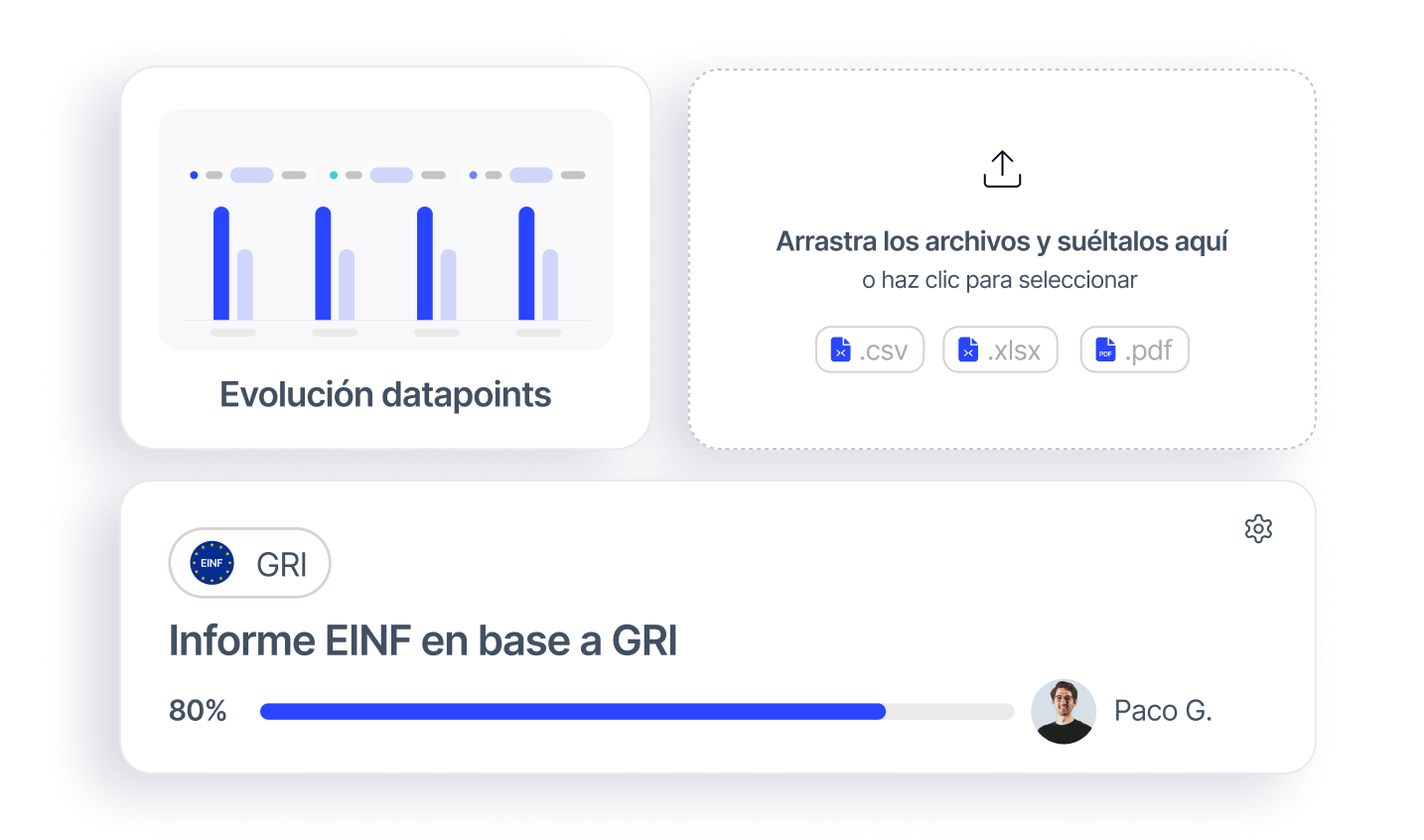Prepárate para la CSRD y futuras regulaciones


En un mundo donde la sostenibilidad no es una opción sino una necesidad, ¿está tu empresa preparada para liderar el cambio? La Directiva sobre Informes de Sostenibilidad de las Empresas (CSRD) emerge como un componente crucial en la estrategia empresarial, marcando el comienzo de una nueva era de obligaciones regulatorias y oportunidades de innovación.
La CSRD puede parecer compleja. Un software CSRD te guía en todo el proceso de forma clara y automatizada
A partir del 1 de enero de 2023, las empresas enfrentarán un nuevo conjunto de desafíos y oportunidades. La CSRD afectará a más de 49.000 empresas europeas, incluidas grandes empresas, compañías de seguros, entidades de crédito y empresas que cotizan en bolsa.
La CSRD es una iniciativa de la Unión Europea que busca incrementar la transparencia en las actividades empresariales relacionadas con la sostenibilidad. Abarca aspectos como el impacto ambiental, social y de gobernanza. Su cumplimiento no solo es una obligación, sino una oportunidad para destacar en un mercado cada vez más consciente del impacto ambiental.Los nuevos requisitos de divulgación de la CSRD buscan:
- Aumentar la transparencia para inversores, consumidores y otras partes interesadas.
- Ayudar a las empresas a gestionar los riesgos relacionados con la sostenibilidad.
- Fomentar la innovación en materia de sostenibilidad.
Es crucial entender qué entidades están sujetas a estas nuevas regulaciones:

Iniciar el cumplimiento de la CSRD requiere primero una comprensión sólida de sus requisitos y una evaluación interna detallada para identificar áreas de mejora. La integración de sistemas de gestión de datos es crucial, asegurando datos precisos y transparentes para estrategias de sostenibilidad efectivas. La capacitación del equipo y la divulgación transparente de las prácticas son esenciales, fortaleciendo la confianza y la reputación de la empresa entre los stakeholders.Las soluciones digitales juegan un papel clave en el cumplimiento efectivo de la CSRD, automatizando la recopilación y análisis de datos, y garantizando flexibilidad ante regulaciones cambiantes. Adoptar estas tecnologías permite a las empresas no solo cumplir con la normativa, sino también liderar en innovación y sostenibilidad, transformando los desafíos de la CSRD en oportunidades de crecimiento.
La CSRD facilitará a estos grupos tomar decisiones informadas, mejorando la confianza y la reputación de las empresas. Además, promoverá la innovación en sostenibilidad, motivando a las empresas a desarrollar nuevas formas de operar de manera sostenible.
Dcycle surge como un facilitador clave en este escenario. Nuestra solución integral automatiza y simplifica la recopilación de datos, el análisis y el reporte, haciendo que el cumplimiento de la CSRD sea menos abrumador. Certificada por TÜV y en conformidad con la norma ISO 14064, Dcycle ofrece una plataforma confiable y eficiente para gestionar la huella de carbono y otros aspectos clave del reporte de sostenibilidad.
Cumplir con la CSRD puede parecer un desafío, pero con las herramientas y la orientación adecuadas, se puede transformar en una oportunidad estratégica. Te invitamos a descubrir cómo nuestra herramienta, Dcycle, puede simplificar el cumplimiento de la CSRD para tu empresa.
Sí, en la práctica muchas empresas industriales tienen que responder igual. Clientes y bancos piden datos de cadena de valor, huella y controles.
Puedes no publicar, pero vas a tener que demostrar.
Depende de tu doble materialidad, pero en industria suelen aparecer con frecuencia E1 (clima), E2 (contaminación y sustancias), E5 (circularidad), S1 (seguridad y condiciones laborales), S2 (cadena de valor) y G1 (conducta y controles).
Se estructura como proceso: inventario de IROs por planta y proceso, criterios de evaluación, umbrales, evidencias y decisiones registradas.
Así puedes defender el por qué ante revisión y repetirlo cada año sin reinventarlo.
Lo mínimo viable suele estar ya en tu organización: facturas y contadores de energía, datos EHS, compras y proveedores, RRHH y PRL, y registros de residuos y agua.
Se puede arrancar con un piloto por planta y escalar.
Con un enfoque realista: datos primarios cuando existan, y factores secundarios justificables cuando no.
Con trazabilidad de supuestos, versiones y evidencias por categoría.
